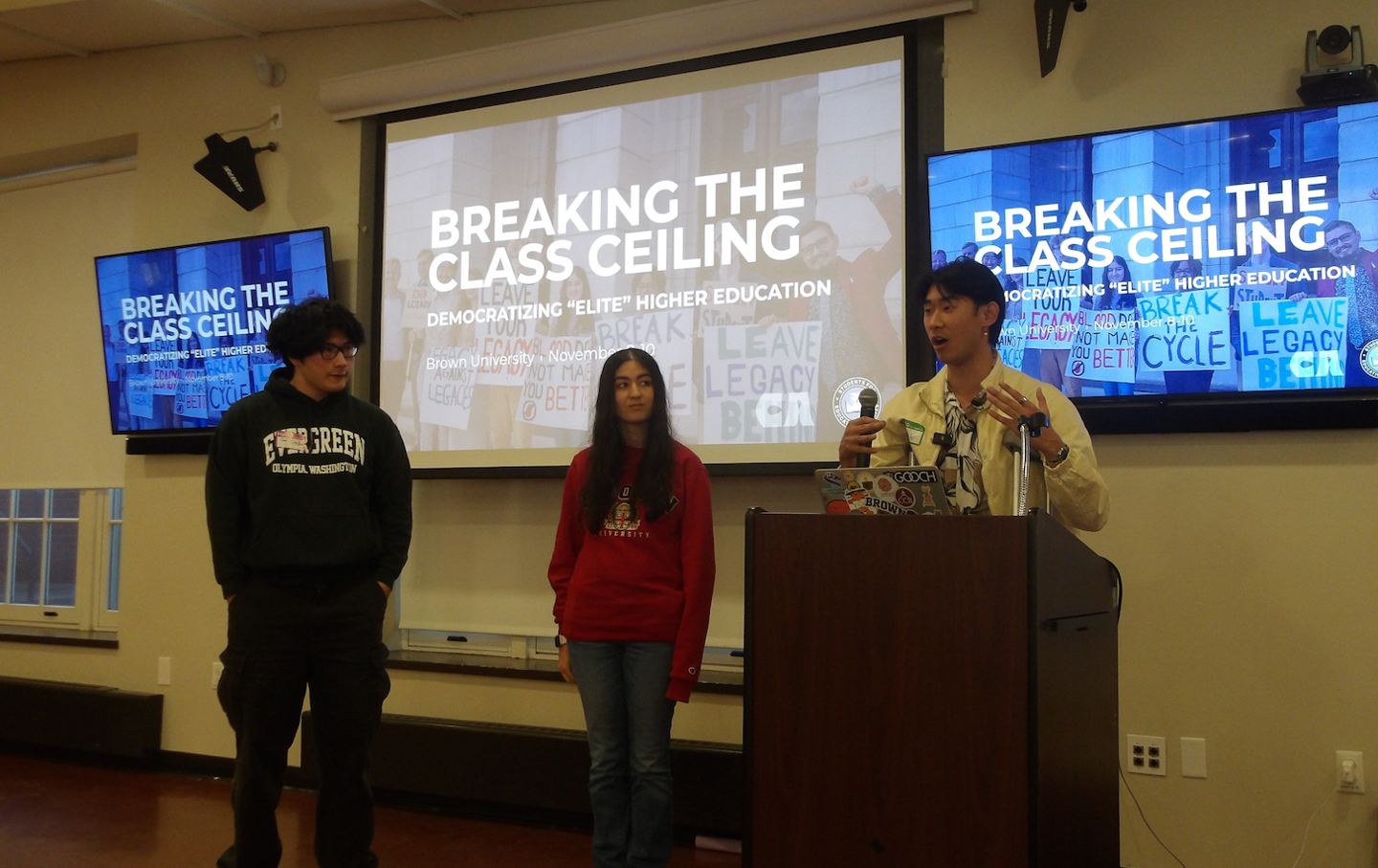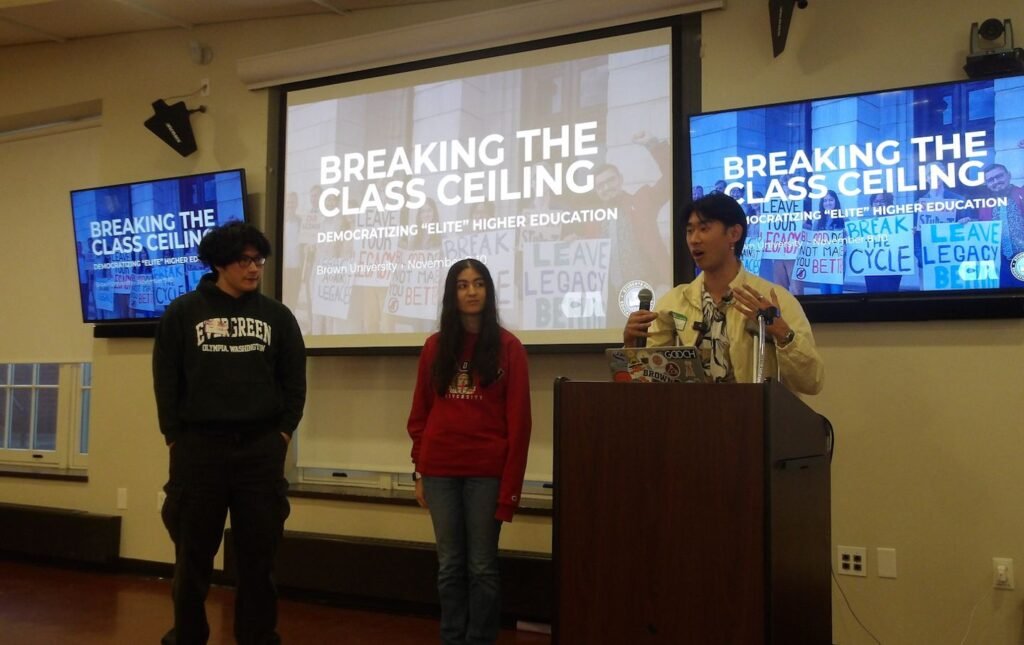In November, organizers from more than 18 universities met at a conference with Class Action to discuss how to democratize higher education.

Presentation at a conference organized by Class Action and Brown University Students for Educational Equity.
(Jem Manolios)
After the decision of the Supreme Court in Students for Fair Admissions v. Harvard in June 2023, which ended affirmative action, the dream of educational equality may have seemed even more distant. Enrollment of black students at Brown University, for example, dropped 40 percent for the class of 2028. At MIT, its newest class is only 5 percent black, compared to the average 13 percent.
“Although I am painfully aware of the social and economic devastation that has befallen my race and all who suffer discrimination,” he said Judge Clarence Thomas“all people are created equal, are equal citizens and should be treated equally before the law.” But across the United States, students are still fighting for equal treatment in admissions. Organizers from more than 18 universities met at Brown in November for Class Action’s first-ever conference to discuss how to “democratize elite education” and end legacy admissions.
While affirmative action has been repealed, elite colleges still use “affirmative action for the wealthy,” according to Class Action, citing the Ivy League’s overwhelming preference for legacy admissions — or the children of graduates who are “more more likely than other applicants to be white and wealthy.” These institutions admit more applicants from the top 1 percent of the country’s population than from the bottom 50 percentgiving a great advantage to the already rich and powerful. “The most prominent institutions in the country, like Brown and Stanford, Princeton and Yale, have clearly nepotistic practices,” said Ryan Chelowski, a Stanford graduate who founded Class Action in 2015. 10% of family income,” according to the Class Action website. “And according to a 2019 study, 7 out of 10 Harvard students were white.”
Over the course of three days, student leaders from Stanford, Harvard, Georgetown, Cornell, Columbia, Princeton, Yale, and others met to “share organizing strategies and tactics used across institutions” and forge connections for collaboration. “To see all these students from all over the country passionate about making a difference and ending legacy admissions, fighting career redirection and just making sure there’s a level playing field,” said Shawn Jimenez, a Bowdoin sophomore and conference participant, “is really cool. .”
In 2018, Brown University students founded Students for fair education initiative and sponsored a referendum on ending inheritance. The vote was supported by 81 percent of the student body, but did not elicit a response from the administration. Organizers began looking for support outside their campuses. “Once we saw that this movement could go from one coast to the other, we knew there was something here,” said Madison Harvey, junior and co-president of Brown SEE.
Student-led anti-inheritance legislation has gained significant traction in the past few months. “We recently passed a bill in the Rhode Island House, H 8202, to eliminate outdated admissions preferences across the state of Rhode Island, even though Brown University is one of the only universities to do so,” said Co-President Nick Lee.
In California, Class Action fought a similar bill earlier this year. “The national anti-inheritance and corporate career organization, Class Action, has established a presence at Stanford,” wrote Stanford Daily in May. “In April, students demonstrated in support of AB 1780 at the Sacramento State Capitol.” Six months later, California Governor Gavin Newsom signed AB 1780, doing just that fifth state to ban inheritance.
The change will take effect in the 2025-2026 admissions cycle. and will affect private institutions such as Stanford University and the University of Southern California, not just public universities. “In California, everyone should be able to get ahead through merit, skill and hard work,” Newsom said. “The California Dream shouldn’t just be available to the lucky few, so we’re opening the door to higher education wide enough for everyone, and fairly.”
But for organizers with Class Action, it’s not enough to opt out of pre-admission. Students at Johns Hopkins University, which no longer uses legacy preferences, explained how the admissions process should be followed by targeted programs for first-generation students. “We don’t have support systems for these students,” says Yvette Shu, a sophomore.
“I was one of the lucky ones who slipped through the doors of an elite school,” Chalovsky said. “Universities are not doing enough to promote socioeconomic diversity, to promote the public good, and (students) are willing to mobilize and organize against that.”
We cannot retreat
We now face a second Trump presidency.
There is nothing to lose. We must use our fears, our grief, and yes, our anger to oppose the dangerous policies that Donald Trump is unleashing on our country. We rededicate ourselves to our role as principled and honest journalists and authors.
Today we are also preparing for the future struggle. It will require a fearless spirit, an informed mind, wise analysis and humane resistance. We are faced with the passage of Project 2025, a far-right Supreme Court, political authoritarianism, rising inequality and record homelessness, a looming climate crisis and conflicts abroad. Nation will expose and propose, develop investigative reporting and act together as a community to preserve hope and opportunity. NationThe work will continue — as it has in good times and bad — to develop alternative ideas and visions, deepen our mission of truth-telling and in-depth reporting, and expand solidarity in a divided nation.
Armed with 160 years of courageous independent journalism, our mandate remains the same today as it was when the Abolitionists were founded Nation— to defend the principles of democracy and freedom, to serve as a beacon in the darkest days of resistance, and to see and fight for a bright future.
The day is dark, the forces are building tenaciously, but it’s too late Nation editorial board member Toni Morrison wrote “No! This is just the time when artists go to work. No time for despair, no room for self-pity, no need for silence, no room for fear. We speak, we write, we make language. This is how civilizations heal.”
I encourage you to support Nation and donate today.
next,
Katrina Vanden Heuvel
Editorial Director and Publisher, Nation


